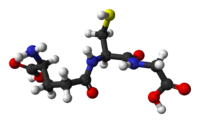
Photo from wikipedia
A sex-specific prion-amyloid interaction predicts that some Alzheimer’s disease therapies may not work in female patients. Men only for an Alzheimer’s drug target β-Amyloid (Aβ) deposits in the brain contribute… Click to show full abstract
A sex-specific prion-amyloid interaction predicts that some Alzheimer’s disease therapies may not work in female patients. Men only for an Alzheimer’s drug target β-Amyloid (Aβ) deposits in the brain contribute to the progression of Alzheimer’s disease (AD) by inducing excitotoxic signaling in neurons. Aβ binds to the metabotropic glutamate receptor mGluR5, and pharmacological inhibition of mGluR5 reverses cognitive decline in male AD model animals. However, Abd-Elrahman et al. found that Aβ bound to mGluR5 in postmortem brain tissue only from male AD model mice and male human donors. This sex-selective interaction was mediated by prion protein in male mouse brain tissue. The findings suggest that mGluR5 inhibitors may be therapeutically beneficial only for male patients with AD. The prevalence, presentation, and progression of Alzheimer’s disease (AD) differ between men and women, although β-amyloid (Aβ) deposition is a pathological hallmark of AD in both sexes. Aβ-induced activation of the neuronal glutamate receptor mGluR5 is linked to AD progression. However, we found that mGluR5 exhibits distinct sex-dependent profiles. Specifically, mGluR5 isolated from male mouse cortical and hippocampal tissues bound with high affinity to Aβ oligomers, whereas mGluR5 from female mice exhibited no such affinity. This sex-selective Aβ-mGluR5 interaction did not appear to depend on estrogen, but rather Aβ interaction with cellular prion protein (PrPC), which was detected only in male mouse brain homogenates. The ternary complex between mGluR5, Aβ oligomers, and PrPC was essential to elicit mGluR5-dependent pathological suppression of autophagy in primary neuronal cultures. Pharmacological inhibition of mGluR5 reactivated autophagy, mitigated Aβ pathology, and reversed cognitive decline in male APPswe/PS1ΔE9 mice, but not in their female counterparts. Aβ oligomers also bound with high affinity to human mGluR5 isolated from postmortem donor male cortical brain tissue, but not that from female samples, suggesting that this mechanism may be relevant to patients. Our findings indicate that mGluR5 does not contribute to Aβ pathology in females, highlighting the complexity of mGluR5 pharmacology and Aβ signaling that supports the need for sex-specific stratification in clinical trials assessing AD therapeutics.
Journal Title: Science Signaling
Year Published: 2020
Link to full text (if available)
Share on Social Media: Sign Up to like & get
recommendations!